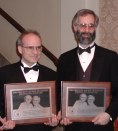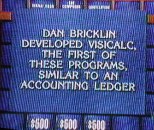danbricklin.com/log
|
||
|
|
Starting February 5, 2001
Wasington Award, Improving performance, O'Reilly Peer-to-Peer conference, A book about caffeine, A question on Jeopardy, Speaking at P2P conference
5-23Feb01
2001_02_05.htm
|
|
Friday, February 23, 2001
Washington Award
Last night Bob Frankston and I received the Washington Award from the Western Society of Engineers. Previous recipients include Herbert Hoover, Orville Wright, Henry Ford, Grace Murray Hopper, and Jack Kilby. It was a real honor and a very nice ceremony.
 Posing for pictures
You can look at the photo album I put together for my family and friends to see the event. It includes some pictures from the morning at the Massachusetts Software and Internet Council meeting.
Tuesday, February 20, 2001
Improving performance
I decided to leave the coverage of the P2P conference to others. You can read writeups on O'Reilly's coverage page, as well as Evan Williams' blog, Dave Winer's, and elsewhere.
O'Reilly came out with a book about P2P that shipped during the conference: Peer-to-Peer: Harnessing the Power of Disruptive Technologies. (I linked to O'Reilly's material on their web site, not Amazon, because I know O'Reilly has a problem with Amazon and their use of patents.) I'm one of the contributors to the book: It has a copy of my Cornucopia of the Commons essay.
   Many of the book authors sat at tables for a book signing event at the conference
I read some of the book on the plane ride home. I like it. It's very pragmatic, trying to get its hands around what the term P2P evokes in people. It surveys the work that is currently happening in the field by having detailed articles written by the people involved. There is real meat here, and the tone is much less "political" about P2P than I expected. All sorts of areas are addressed, including file sharing, CPU-cycle sharing, personal publishing, trust, and more.
One of the issues related to P2P is performance. Peer-to-peer techniques can lead to lower cost or higher performance through the use of distributed processing, storage, and bandwidth. That was one of the points of my talk (the part that I added in addition to the original essay), and is something that comes up over and over again when people discuss the benefits of P2P. On the other hand, if you aren't careful in your system design, performance bottlenecks can really snowball in a distributed network, as Gnutella showed.
The book repeatedly reminds people to look at successful distributed systems of the past, like Usenet and the DNS, to learn good techniques. For example, the DNS has successfully scaled 10,000 times its original size. It is based on a hierarchy of systems that are both clients and servers. Appropriate use of hierarchy is an important design element.
Addressing performance and using a hierarchy is nothing new. Coincidentally, this week Jews read the portion of the Torah about Jethro (Exodus 18-). Jethro was Moses' father-in-law and a priest of the Midyanites, not an Israelite. While visiting Moses, he noticed that all day and into the night Moses had people lined up around him, waiting their turn for Moses to settle disputes and give legal advice. Jethro said, "The thing that you do is not good. You will surely wear away...for the thing is too heavy for you. You are not able to perform it alone." He then suggested that Moses train and delegate, setting up rulers of thousands, hundreds, fifties, and tens. Moses does this and it helps. "They judged the people at all times. They brought the hard causes to Moses, but every small matter they judged themselves." Moses then lets his father-in-law leave to go home.
This is a story of an early consultant. It took an outsider to see a problem and propose a solution, perhaps an outsider with experience of what worked for others. To find problems, it helps to be an interested outsider, as Jethro was. In fact, I've heard some people say that the purpose of Jethro's advice was to free Moses' time to be more available to his wife and family, Jethro's daughter and grandchildren. (Jethro visits Moses bringing along his wife from whom he was separated at the time.) Some problems stay the same throughout the generations and for people famous and not so famous.
Wednesday, February 14, 2001
O'Reilly Peer-to-Peer conference
I'm sitting in the audience at the O'Reilly P2P conference typing this. Yahoooo for 802.11b! The laptop on my lap is wirelessly on the web. It is becoming more and more common at computer conferences to have a wireless LAN available to attendees. A great base for P2P applications...
   One of 6 wireless access points, looking up from my laptop
There are lots and lots of people here. Clay Shirky is giving a great speech to kick it off. I'd better listen and stop writing.
   Some of the audience behind me, Tim O'Reilly and Clay Shirky opening the conference
I've posted the slides relating to my Cornucopia of the Commons essay that I'm using when speaking this afternoon.
Sunday, February 11, 2001
A book about caffeine
I've added another book review. The book is written by an old acquaintance of mine from high school. It's The World of Caffeine: The Science and Culture of the World's Most Popular Drug.
 Book cover
You can read my review: The World of Caffeine. It's a cool book, scholarly, long, but interesting to read and I think will be popular as a gift or coffee table/bathroom reading. (In case you're an Amazon customer, here's a link to Amazon that I get credit for.)
Monday, February 5, 2001
A question on Jeopardy
Last Thursday was my mother's birthday. During an evening happy birthday call she said that she had just seen my name in an "answer" on Jeopardy, the TV game show. (The contestants try to give the correct question when read an "answer".) Over the next hour other relatives called to say the same thing. By the next day, I was hearing it from all over. I never knew so many people watched the show, nor that they'd notice me buried in a short item.
Since it was too late to watch it myself on my local channel, I checked the TV listings and found that the program was going to be shown on a New Hampshire channel late in the evening. I get that channel on cable, so I taped it. The next morning I got to watch. What a thrill! Of the five questions in the "The Computer Age" category (which was next to the "Diana Ross" category), the contestants were only correct on the one involving the spreadsheet. It was for $200 (meaning it should be easy, which I take as a compliment):
  My moment in the sun coming up in an answer on Jeopardy read by host Alex Trebek
Other "answers", to which the constestants didn't know the correct "question", included: "According to Moore's Law, named for a founder of Intel, these double in power roughly every 18 months" (chips, $100), and "Coherent & Xenix are 2 of these, part of the abbreviation in the better-known MS-DOS" (operating systems, $300). The $500 item was "Among Internet users, the World Wide Web has surpassed the system named for this burrowing rodent." Tough item, though "mole" was a good guess (the correct question is "What is Gopher?").
Speaking at P2P conference
I'm giving a talk next week at O'Reilly's Peer-to-Peer Conference. It will be based on my essay "The Cornucopia of the Commons" about Napster and using volunteer labor. I'll post my slides here after I create them... If you have any examples of other systems that take advantage of selfish use to create value, let me know so I can include them.
 Logo they gave me to post
|
||
|
© Copyright 1999-2018 by Daniel Bricklin
All Rights Reserved.
|
||